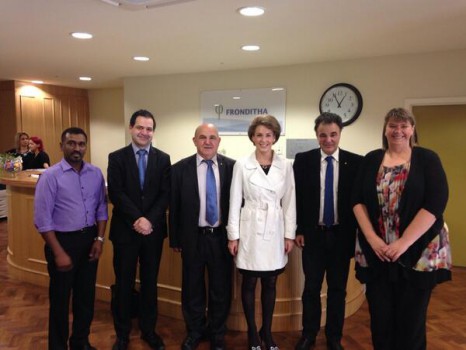
Ethno-specific aged care provider Fronditha Care will be able to sponsor 60 overseas personal care workers as part of the first labour agreement to be negotiated with the Federal Government.


Ethno-specific aged care provider Fronditha Care has been given the green light to sponsor 60 overseas personal care workers in the first agreement to be struck with the Federal Government. It comes amid growing calls for personal care workers to be added to the Skilled Occupations List.
The three-year labour agreement, which had union backing, will allow the Victorian provider to recruit Greek-speaking care workers under the same wages and conditions as local employees.
Under the terms of the deal, the overseas workers will need to have a Cert III in Aged Care attained locally and an English language competency of 5 in the International English Language Testing System (IELTS).
Fronditha chief executive George Lekakis told Australian Ageing Agenda the deal would allow some of the organisation’s Greek-speaking workers currently employed on a student visa, which permits them to work 20 hours per week, to be transferred to full-time employment on a four-year visa.
Former staff that have returned to Greece will also be recruited back to the organisation under this program to help meet the communication needs of residents, he said.
“The care workers will be offered an annualised salary of over $54,000 and health insurance for each year of the labour agreement,” said Mr Lekakis. The organisation can recruit up to 20 overseas care workers per year under the deal.
Labour agreements allow employers to recruit overseas workers in areas of skills shortages that don’t qualify for existing skilled migration programs. The application by Fronditha was the first labour agreement to be negotiated between the government and a health and community services provider.
Assistant Minister for Immigration Michaelia Cash said the evidence required to demonstrate the need to sponsor an overseas worker was significantly higher under a labour agreement than other programs, including the subclass 457 program.
For example, an employer has to demonstrate why vacancies cannot be filled locally and provide evidence of all attempts to recruit local staff over a six-month period. Unions and employer groups must also be consulted on the proposal.
In recent years industry peak bodies and the Community Services and Health Industry Skills Council (CS&HISC) have called on the Federal Government to address the exclusion of personal care workers from the country’s skilled migration programs.
As AAA has reported, the Age Discrimination Commissioner Susan Ryan in February said she had written to the Minister for Immigration requesting him to consider adding aged care workers to the Skilled Occupations List.
Ms Ryan said the move would help meet the growing shortfall in personal care workers and greatly benefit CALD clients.
Senator Cash said the government was exploring options to support the wider health and community sector providers, noting Australia has an ageing population and a diminishing workforce.
Assistant Minister for Social Services Mitch Fifield said while the government was determined to uphold the integrity of Australia’s skilled migration program, the Coalition was “equally committed to a policy of facilitation rather than frustration when it comes to employers accessing the skilled workforce they require, when this need is demonstrated.”
He said any aged care provider could submit an application for a labour agreement, which would be assessed on its merits.
Mr Lekakis said that an earlier application made to the Department of Immigration 18 months ago was rejected but resubmitted following the change of government. He said the personal support from Senator Cash for his bid to recruit bilingual carers was “extraordinary”.
Mr Lekakis recommended other aged care providers considering making an application to prepare their case thoroughly and gain union support early.